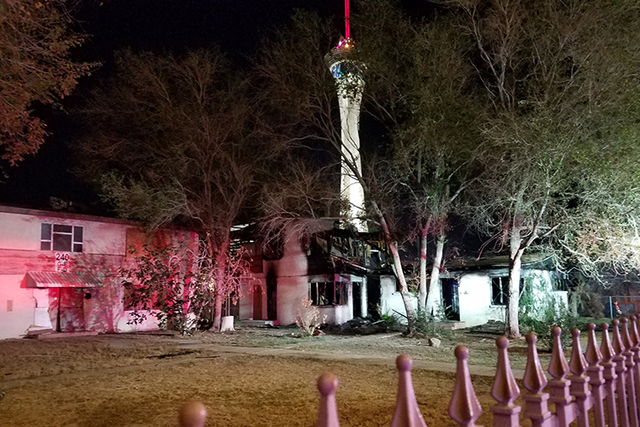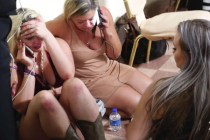Squatting can be associated with other crimes

On Nov. 14, a house near the Stratosphere caught fire for the fifth time in six months.
Las Vegas Fire Department crews doused the familiar 240 Cincinnati Ave. house with water, and the blaze was out in about 10 minutes. The suspected cause of the fire, and the four before it: “squatters.”
It’s a common issue in the valley. But it’s not always an obvious problem to spot, said Lt. Nick Farese, who investigates squatting cases with the Metropolitan Police Department’s northwest valley substation.
While the Cincinnati Ave. home had been burned and boarded up several times, and was a known area for the homeless to frequent, Farese said it isn’t technically a squatting issue.
“That’s a chronic nuisance issue,” he said, noting such matters should be reported to code enforcement.
The squatters Farese investigates are more subtle. They take up residence in a home that’s been foreclosed upon or abandoned by its owners.
“The word squatter gets used pretty liberally,” Farese said. The people he investigates “hang up their pictures, they move their furniture in. Sometimes, do they steal power? Yes. But sometimes, they get the power turned on.”
Real estate agents encounter them often, as do neighbors. But what’s the risk?
Squatting can be associated with other crimes, such as dealing drugs or selling parts from stolen vehicles, Farese said. “You’ll see a lot of foot traffic coming and going from the house.”
Or, Farese added, “Sometimes these people just don’t want to pay $1,000, $2,000 a month for mortgage. They blend in, or want to blend in.”
For that reason, it can be hard to determine whether a new face is a renter or a squatter.
“They don’t like to draw attention to themselves,” he said. That’s why many squatters begin moving in about 11 p.m. or 1 a.m., and continue through the night, in the cliche “cover of darkness.”
Without the keys, squatters often have to drill out a vacant home’s locks. Neighbors or homeowner association members also may spot someone changing the locks in the morning.
“Typically if someone rents a house, they’ll get keys from a landlord,” Farese said.
If you suspect squatters have moved into a home in your community, Farese recommends calling Metro’s non-emergency line, 311, or calling your neighborhood Metro substation, then asking to speak with someone in the community-oriented policing unit.
Farese said it can be hard to prosecute squatters, because the original homeowners need to verify with police that they have not given the squatters permission to take up residence in their home, which requires time and research, since many homeowners leave the state.
Still, Farese urged neighbors to make the initial call.
“It’s definitely something we’d want to know about,” he said. “They just need to understand that just because they report it, we typically won’t make an arrest that day.”
Vegas Vice appears every other Saturday. Contact Rachel Crosby at rcrosby@reviewjournal.com or 702-387-5290. Follow @rachelacrosby on Twitter.












